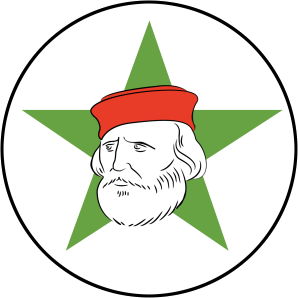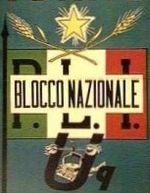An electoral alliance is an association of political parties or individuals that exists solely to stand in elections.
Liberalism and radicalism have played a role in the political history of Italy since the country's unification, started in 1861 and largely completed in 1871, and currently influence several leading political parties.

The Christian Democratic Centre was a Christian-democratic political party in Italy from 1994 to 2002. The CCD was a member of the European People's Party (EPP).

The French legislative elections took place on 16 March 1986 to elect the eighth National Assembly of the Fifth Republic. Contrary to other legislative elections of the Fifth Republic, the electoral system used was that of party-list proportional representation.

The Popular Democratic Front, shortened name of the Popular Democratic Front for Freedom, Peace, Labour was a political alliance of political parties in Italy.
The far-right tradition in France finds its origins in the Third Republic with Boulangism and the Dreyfus Affair. The modern "far right" or radical right grew out of two separate events of 1889: the splitting off in the Socialist International of those who chose the nation and the culmination of the "Boulanger Affair", which championed the demands of the former Minister of War General Georges Boulanger. The Dreyfus Affair provided one of the political division lines of France. Nationalism, which had been before the Dreyfus Affair a left-wing and Republican ideology, turned after that to be a main trait of the right-wing and, moreover, of the far right. A new right emerged, and nationalism was reappropriated by the far right who turned it into a form of ethnic nationalism, itself blended with anti-Semitism, xenophobia, anti-Protestantism and anti-Masonry. The Action française, first founded as a review, was the matrix of a new type of counter-revolutionary right-wing, and continues to exist today. During the interwar period, the Action française (AF) and its youth militia, the Camelots du Roi, were very active. Far right leagues organized riots.

The Pact for Italy was a centrist political and electoral alliance in Italy launched by Mario Segni and Mino Martinazzoli in 1994.

The Alliance of Progressives, also known as simply the Progressives (Progressisti), was a left-wing to centre-left political and electoral alliance of political parties in Italy formed in 1994, with relevant predecessors at local level in 1993. The leader of the alliance was Achille Occhetto.
In politics, a political alliance, also known as a coalition or bloc, is cooperation by members of different political parties, in countries with a parliamentary system, on a common agenda of some kind. This usually involves formal agreements between two or more entire parties. An alliance is usually especially beneficial to the parties concerned during and immediately after elections – due to characteristics of the electoral systems concerned and/or allowing parties to participate in formation of a government after elections. These may break up quickly, or hold together for decades becoming the de facto norm, operating almost as a single unit. Alliances may also form prior to elections in an effort to reduce uncertainty following the election.

The Simón Bolívar Great Patriotic Pole is a left-wing socialist and chavist electoral alliance/popular front of Venezuelan political parties created in 2012 to support the re-election of Hugo Chávez in the 2012 presidential election.
The centre-right coalition is a political alliance of political parties in Italy, active—under several forms and names—since 1994, when Silvio Berlusconi entered politics and formed his Forza Italia party.
A popular front is "any coalition of working-class and middle-class parties", including liberal and social-democratic ones, "united for the defense of democratic forms" against "a presumed Fascist assault". The phrase has also been used to refer to political coalitions "sponsored and dominated by Communists as a device for gaining power". More generally, it is "a coalition especially of leftist political parties against a common opponent".

The Democratic Front is a right-wing populist and social conservative political alliance in Montenegro. It is currently composed of the New Serb Democracy, Movement for Changes and Democratic People's Party, with Yugoslav Communist Party, Serb Radical Party and some other minor parties as the alliance's partners at the local level, while United Montenegro and Workers' Party are external members of the Democratic Front parliamentary group. The main goal of the DF is to overthrow the ruling Democratic Party of Socialists, which was in power in country since introduction of the multi-party system in 1990, until 2020 parliamentary election.
The centre-left coalition is an alliance of political parties in Italy active, under several forms and names, since 1995 when The Olive Tree was formed under the leadership of Romano Prodi. The centre-left coalition ruled the country for more than thirteen years between 1996 and 2021.
All Rome residents who are at least 18 years old and hold an EU citizenship are eligible to vote for the Mayor and the 48 members of the Capitoline Assembly, as well as for the President and the 30 or 40 members of the Council of the Municipality where they reside.
Democratic elections have been held in Naples, Italy, since the collapse of Benito Mussolini's fascist regime. Today, all residents of Naples who are at least 18 years old and hold an EU citizenship are eligible to vote for the mayor and the 48 members of the city council. They also vote for the president and the 30 or 40 members of the municipal council in which they reside.







